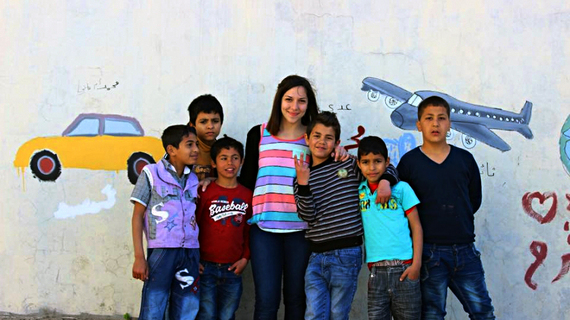This year, the world has seen clearly the costs of extremism and political instability.
After months of violent attacks on nearly every continent and facing the biggest refugee crisis since World War Two, we're forced to wrestle with hard questions. We're grappling with how to address the root causes of political violence. We're struggling with how to create a world not burdened by the shadow of extremism, intolerance, and hate. Through Teach For All, I'm in regular contact with education leaders from around the world; they all find themselves asking, "What can we do in our classrooms today to create a better future?"
Still reeling from attacks in her home city, Teach For France's CEO, Nadia Marik-Descoings, questions whether we are really providing children with an education that will put them on a path to fulfilling, meaningful lives and careers. Ulf Matysiak, the CEO of Teach First Deutschland --whose own country accepted more than 1,000,000 migrants in 2015 -- believes deeply in migrants' ability to contribute to their new society. Rather than asking refugee children where they come from, he challenged us to consider what they would like to become. And Evgenia Peeva, the CEO of Teach For Bulgaria, wonders if we are doing enough to effectively bridge diversity by teaching the values of community, empathy, and collaboration.
The conversations I've had with these people fortify my belief in the power of many voices, from many countries, coming together to inform and strengthen local efforts to develop students' leadership and lay a foundation for engaged global citizenship.
The events of recent months demonstrate that no matter where we live, our fates are interconnected. To improve our collective welfare, we must work together to define visions for students that go far beyond academic outcomes and seek to empower their leadership and moral character. And then, as a global community, we need to work together to help provide this high standard of education to every child. If we are serious about creating a better future, there is no other option.
Across Teach For All, we've seen this approach foster peace, hope, and opportunity, while cultivating tolerance and understanding.
Participants teaching through our partner organizations in the Middle East are helping students affected by conflict cope with trauma and channel their energy toward a more hopeful future. Farah Mhanna, of Teach For Lebanon, leads a class of students orphaned by war.
When Farah first entered the classroom, her students saw no value in education because their past taught them to believe that weapons and violence could solve any problem. Yet, Farah committed to reaching each of them and helping them believe in their own potential. She designed a curriculum around content that she knew would resonate with them and worked hard to forge a connection with her most challenging students.
After six months, Farah's persistence and dedication paid off. She broke through the seemingly intractable invisible wall and was able to talk openly with them about the war, their violent past, and their hopes for the future. They began to recognize that war was the cause of their anger and that something better is possible. Together, Farah and her students created a video about their hopes and dreams; in it, they made clear that education -- not weapons -- is their only path forward.
In Germany, Syrian refugees attend schools in low-income neighborhoods where the group that forced them from their homes regularly recruits. Leading many of those classes are Teach First Deutschland participants. These teachers are committed to making sure that all students are treated as productive members of German society and feel connected to their communities. The teachers organize community service projects where, together with their German-born peers, migrant students from across Europe and the Middle East give back to their new community. These projects help instill dignity and respect, affirming the fact that they may become Germany's next business owners, doctors, educators, and community leaders.
In Lebanon, Germany, and around the world, our future depends on the kind of adults our children become. Kusum, a grade 6 student taught by Teach For India participants at a government school in Delhi, embodies the leadership that our global society needs. At school, she is learning to become a citizen who will create a better future for us all. "To build a vision...we all need to work together," Kusum tells us.
Given the challenges we face, there has never been a more urgent time for us to come together as a global community to ensure that in every country, in every classroom, we are providing children with an education that puts them on a path to a meaningful life and instills in them the values of tolerance, peace, and respect for diversity. Failing to do so will put all of our futures at risk.
